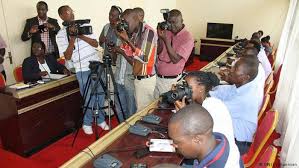A new report released by the United Nations on Thursday said genuine reconciliation and lasting peace will only be achieved in war-torn South Sudan if people are free and safe to express their opinions regardless of their ethnic or political affiliations.
The new report, co-authored by the UN Mission in South Sudan (UNMISS) and the UN Human Rights Office, warns that undue restrictions on freedom of expression are having a “chilling effect” and “further shrinking the space for debate and dissent”, while incitement to hatred also continues to cause mistrust, fear and violence.
The report that covers the period from July 20161 to December 2017 blamed the government for restriction on the freedom of
expression in the country.
“South Sudan’s conflict, with widespread human rights violations and abuses committed by all parties, has inflicted untold suffering on millions. People have been denied the right to life, the right to justice, and, as this report details, the right to freedom of opinion and expression – rights that are not luxuries but are essential to bring about peace and development,” said UN High Commissioner for Human Rights Zeid Ra’ad Al Hussein.
“It is vital that the voices of all the people of South Sudan are heard so that genuine, inclusive and durable peace can be achieved,” said the Special Representative of the Secretary-General and Head of UNMISS, David Shearer. “All parties to the conflict must respect people’s right to freedom of expression regardless of their ethnicity, beliefs or political views.”
The report identified 60 verified incidents which violated the legitimate exercise of the right to freedom of expression of 102 victims, including 17 women, in the period from July 2016 to December 2017.
The report stated that incidents included the killing of two people, the arbitrary arrest and detention of 58 others, 16 people dismissed from their jobs, the closure or suspension of three newspaper printing establishments, censorship of newspaper articles and the blocking of independent news websites including Radio Tamazuj.
Those targeted, according to the report, were seen to be critical of the government, tarnishing the country’s reputation, or dealing with issues deemed sensitive.
The report pointed out only violations within government-controlled territory were able to be verified because of insecurity and access restrictions in opposition-held areas.
The report found that government security forces, including the National Security Service (NSS), Sudan People’s Liberation Army (SPLA) and the South Sudan National Police Service (SSNPS), were responsible for two-thirds of the verified cases of human rights violations.
The NSS’ broad powers of surveillance, arrest and detention, including the embedding of its officers in some media offices, meant that people were deterred from participating and discussing the state of the country or human rights, the report stated. This has led to a growing climate of self-censorship.
It further said many victims said they had not lodged formal complaints because of fear of reprisals by influential people and a lack of trust in institutions including law enforcement and the judiciary.
The report acknowledged efforts by the government, civil society, and other stakeholders to promote an inclusive and safe environment for the exercise of the right to freedom of expression and the promotion of democratic dialogue, including through the release of political activists and journalists from prolonged and arbitrary detention.
The report recommended that amendments of legislation to decriminalize defamation and ensure that powers given to security forces do not infringe on the legitimate exercise of the right to freedom of expression.
It also urged for investigations into violations of the right to freedom of expression, while emphasizing the need for strengthening mechanisms to combat incitement.
The report also called on all armed forces to guarantee the protection of journalists, civil society, and human rights defenders and respect their right to monitor and report on the armed conflict.




